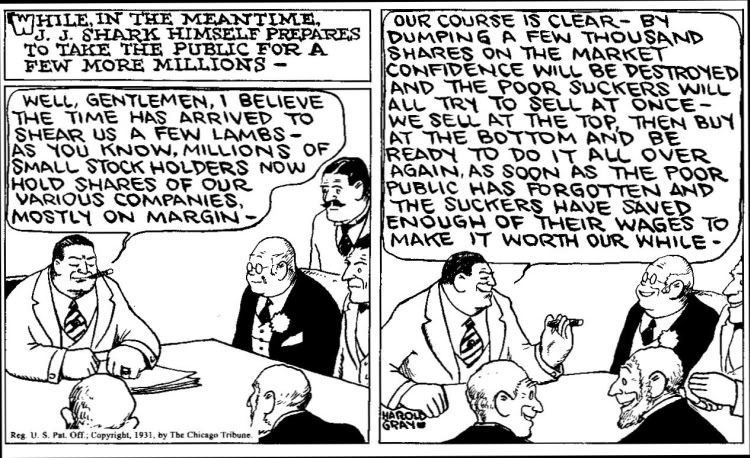Little Orphan Annie vol. 3: 1929-1931

Little Orphan Annie volume 3: And a Blind Man Shall Lead Them by Harold Gray. As Jeet Heer writes in the introduction, the Great Depression really inspires the best storytelling from Harold Gray. This volume is set in the early, worst years of the Depression, and while Gray is an optimistic guy by nature, he doesn't shrink from portraying the harsh conditions Americans found themselves in. Heer points out a panel from December 13, 1930:

Heer calls this image "shocking," and certainly it's not what we think about when we think of America, nor what we imagine when we think of comic strips. Gray in this volume is continuously juggling two contradictory thoughts--first, and atypical for him, is that people are in hard, desperate situations not because they are failures, but because there aren't enough jobs, and what jobs there are are terrible. Second, by pulling together, but mostly by pluck, hard work, and common decency, folks in dire straits can overcome this situation. I don't blame Gray having (and fictionalizing) these opinions--you almost have to hold them both to hope to get through a depression.
The best example of the two points of view is shown in the fall and rise of Daddy Warbucks. This is my favorite Little Orphan Annie sequence. Warbucks' enterprises, like so many in the Depression, go bankrupt. Warbucks and Annie are knocked back to the bottom of the working class, living in a tenement, Warbucks unemployed and desperate for work. He first looks for a job as a business executive, but soon has to lower his sights to the very bottom. It's hard for him to find work, and what work he finds is temporary. He gets taken by dishonest employment brokers. He, like so many of the working class, finds himself utterly helpless, lacking any ability to change his situation. The last straw is when he is working as a truck-driver. He swerves to avoid a child, hits an El pylon, and is blinded in the crash. In the hospital, he finds his employer has disclaimed all responsibility--going so far as to claim that Warbucks was never an employee in the first place. (Of course, Annie is thriving in her tenement, as usual. She blossoms in poverty.)
A few plot twists later, Warbucks has his pluck restored. Partnering with a midget (!) named Flophouse Bill, he quickly regains his fortune. (In typical Warbucks fashion, he avoids contacting Annie, although he does keep tabs on her.) He learns that the man who ruined him before is a competing financier/industrialist named J.J. Shark. Just as Warbucks and Bill have reached a minor level of success, we learn of Shark's latest nefarious plan.

This was a common practice during the 1920s. It was called a "stock pool," and involved wealthy individuals, like Shark and his compatriots, pooling their money to manipulate a specific stock. In this case, the stock pool was a "bear raid," designed to drive a stock down so that the raiders could pick it up cheap. This was perfectly legal in 1931 when Shark formed his pool. It became illegal with the Securities Act of 1933. But even before 1933, most people recognized that there was something basically unfair and immoral about rich insiders profiting off of small investors through such schemes.
But Warbucks is not just any small investor. When the bear raid begins, he smells Shark's hand behind it. While Bill urges him to sell, he holds out and buys near the bottom before Shark and his fellow pool members can. In this way, he is able to take over Shark's business. (Ironically, in order to do this, he has to participate in fleecing the other small investors, who were fooled into selling their stock.)
Of course, Little Orphan Annie is still a fairy tale. So not only does Warbucks go from an penniless blind man to being a billionaire in three months, but he gets his eyesight back in an experimental operation!
I look forward to seeing how Gray deals with the Depression as recovery continues to be slow and the government picks up the slack through various work programs. Gray is known to be a conservative Republican, and one who got more conservative as time went on. But even though he is politically conservative, in this and previous volumes, he shows great sympathy for workers, small shopkeepers, farmers, and other people who are vulnerable to economic forces over which they have no control.

2 Comments:
"But even though he is politically conservative, in this and previous volumes, he shows great sympathy for workers, small shopkeepers, farmers, and other people who are vulnerable to economic forces over which they have no control."
"Bur even though he is politically conservative" -- Because, of course, we all know that NORMAL conservatives HATE workers, small farmers, and the vulnerable.
Hate is not the word I would use, but certainly it has been my observation that old-school conservatives were more likely to care more about the Warbucks of this world than unemployed or exploited workers, for example.
Post a Comment
Subscribe to Post Comments [Atom]
<< Home